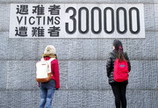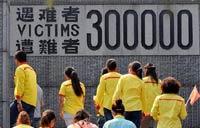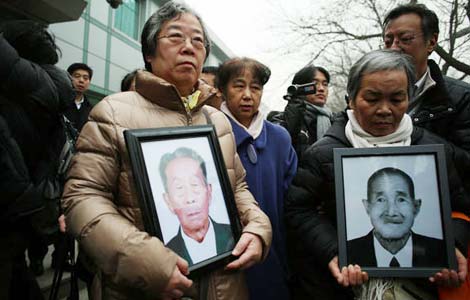

A Foreign Ministry leader on Thursday urged Japan's leaders to reflect honestly on Japanese aggression following China's designation of two national days to mark victory in the anti-Japanese war and to commemorate victims of the Nanjing Massacre.
 Experts in China and around the globe hailed the decision by China's top legislature on Thursday to ratify two new national days regarding Japan's wartime atrocities in China.
Experts in China and around the globe hailed the decision by China's top legislature on Thursday to ratify two new national days regarding Japan's wartime atrocities in China.
Japan should face up to and reflect on its aggression history and not make critical comments about China's memorial activities, a Defense Ministry spokesman said on Thursday.
Japan should seriously address issues regarding forced labor during its aggression war, Chinese Foreign Ministry spokeswoman Hua Chunying urged on Thursday.
 Beijing ratifies Sept 3 as Victory Day in war against Japanese aggresssion and Dec 13 as Memorial Day for victims of Nanjing Massacre.
Beijing ratifies Sept 3 as Victory Day in war against Japanese aggresssion and Dec 13 as Memorial Day for victims of Nanjing Massacre.
 The two sessions are just around the corner and it is widely expected that strained China-Japan relations will be a hot topic for Chinese lawmakers and political advisers when they gather in Beijing.
The two sessions are just around the corner and it is widely expected that strained China-Japan relations will be a hot topic for Chinese lawmakers and political advisers when they gather in Beijing.
There is no reason a priori why China's rise should inevitably result in war. Nor, however, is there any reason a priori why it should not.
 37 Chinese citizens filed a lawsuit in a Beijing court demanding Japanese apologies and compensation for forced labor during World War II.
37 Chinese citizens filed a lawsuit in a Beijing court demanding Japanese apologies and compensation for forced labor during World War II.
A report from the US Congress blasted Japanese Prime Minister Shinzo Abe's view on Japan's militarist history, saying his visit to the Yasukuni Shrine has led to mounting mistrust between Tokyo and Washington.
 A Beijing court accepts a lawsuit demanding compensation for Chinese victims made by the Japanese to work as forced laborers during WWII.
A Beijing court accepts a lawsuit demanding compensation for Chinese victims made by the Japanese to work as forced laborers during WWII.
Zhao Jinping, A New Start: Japan's Economic Recovery and China-Japan Economic Relations, Beijing: China Renmin University Press